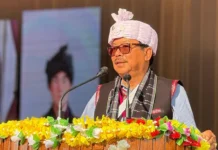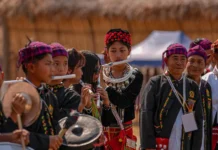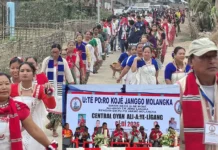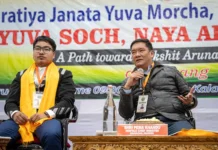The world, with great excitement, is celebrating the season of Advent. Closer in our homeland though, the approaching god notion is, first of all, a harsh contradiction: “For my thoughts are not your thoughts, neither are your ways my ways, says the lord.” We know that god is different. He is by no means the fulfillment of human thoughts. We stand as if under a dark fate.
Christ’s advent is all about restoring peace and hope among human beings. Peace is much more than absence of war and threats. Peace among the Nagas should be blessing, healing, and wellbeing, togetherness and righteousness. Christ’s advent brings into our world his joy and his fortune of peace. This kind of peace is a new life and new human-hood, not only the absence of death and division.
Christ’s advent is also the fulfillment of the hope of human longings and aspirations. Yet, we cannot force divine hope on ourselves; we must first broaden our narrow, human-made walls of security and hope. In order to partake of the hope that god offers us during the advent season through Jesus Christ, we need to be loved. “Accept one another just as Christ has accepted you, to the praise of god.” Let us begin to look beyond our tendency to be influenced by self-righteous identities and rigid boundaries, and instead cultivate a temperament that is open and receptive. Often, we are tempted to dichotomize what is ‘spiritual’ and ‘political’. This is part of the harsh contradiction that we fail to resolve, time and time again.
Nagas cannot force on ourselves that practicing exclusion will lead to a bright light of political harmony. This ritualization of politics breeds more political and social boundaries among us. Consequently, we end up living in a world of exclusion, a world we keep creating because it is a lived reality, so deeply entrenched in our hearts by our hurts, fears, and hate – we are made to believe that exclusion is the solution; that hope lies in excluding others. Perhaps many people are not even aware that what they are practicing is ‘exclusion’. Advent is a reminder that we need to practice the act of embracing. Reconciliation is not simply an event between the individual and god; it has political and social bearings. One without the other would turn out to be ineffective.
To be sure, reconciliation is not a monopoly of the Forum for Naga Reconciliation (FNR). In the reality of the harsh contradiction that Naga people confront, reconciliation is a piece of jigsaw puzzle that each one of us holds to put together the Naga home. We humbly appeal to all conscientious people and the Naga political groups to be honestly objective, rather than to limit our view with our coloured lenses. We need sincere criticism coupled with critical love. Sarcasm fuelled by ill-will is narcissistic and serves as another form of violence. So also, dogmatism and political rigidity not only isolates ‘others’, but fossilizes the self.
Today, the average Nagas are reinterpreting the past imagination for the sake of the future, and with a renewed optimism, to move forward. As our founding fathers and mothers have said that sovereignty “lies with the people” then, it is up to us to exercise our sovereign rights. As all groups of people relatively are, Nagas are unique in our historical and political rights. This is primordial – the soul of the Nagas. We must urgently advocate and apprehend realism and bury idealism that continues to weaken and divide us.
In the future of the Nagas, as all are stakeholders, together we need to wisely prepare the end of the beginning of a new Nagahood, whose identity is distinct and unique. To have an identity implies a boundary, but in a world of multiple unique identities and boundaries, the Naga boundary must be reflexive and permeable. It is absolutely essential for us to craft an identity and sense of belonging that is distinct but multiple, and discursive and integrative at the same time. Our self-understanding as churches, villages, and tribes must go beyond cultural and geographic categories. This is the unique political paradigm of the post-modern world to which we must adapt if we are to survive and contribute as a people.
Together, side by side, with other ethnic identities and 21st century boundaries of the world we must exist and coexist. If we refuse this paradigm, we are simply excluding ourselves to the future and remain slaves of the past. To rise to the occasion, we must pursue a realistic dream, yet also envision big, locally and globally. Nagas are beautiful and are capable of being in par with others who are coming of age in people building and identity building. We must not let the past suffocate us or dictate our future; we need to creatively reinterpret the past narratives for the sake of a shared Naga future.
We challenge Naga people to think positively that we have not lost anything as long as we remain united and determined to build our peoplehood. Rather, we are more realistic and full of hope; our historical and political rights are here to be cherished, and to be proudly safeguarded, by moving ahead with time. This is the politics of whose identity is historically realistic and relevant. After all, what good is it to passionately guard an identity that is divisive and absolute and thereby not relevant?
FNR earnestly appeals to all to be generous and to stretch our imagination to the future. Our world is a world in the making and hence, every achievement is only the end of a beginning. Let us lift the present to a higher plane of transformation in every sense.
We wish this to be ours and live by it. During this advent tide, we commit to peace and hope with the Naga family. We wish the Naga family and common humanity a season of peace and hope amongst us. (Issued by the Forum for Naga Reconciliation)




